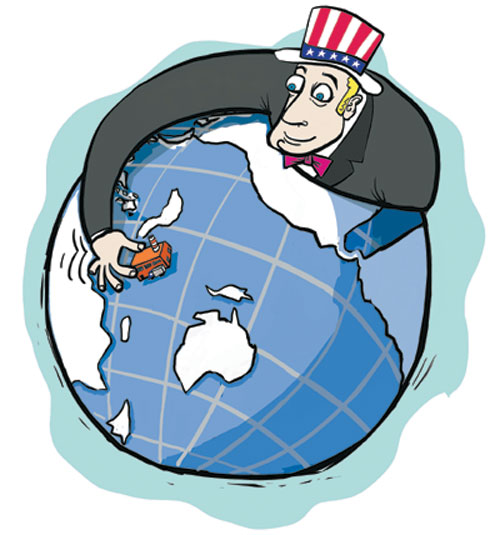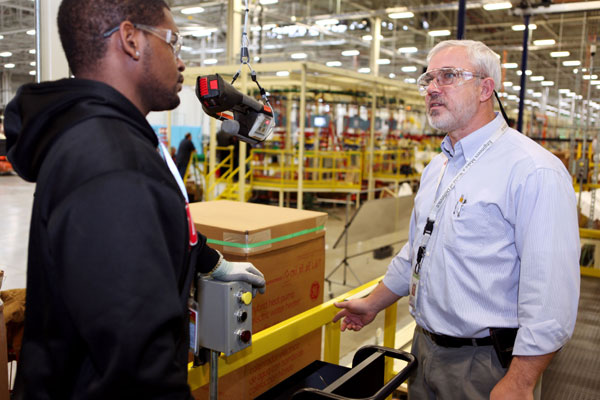US firms returning
Updated: 2012-07-11 09:45
By Joseph Boris, Ariel Tung and Qiu Quanlin (China Daily)
|
|||||||||||
With a few US-based manufacturers "reshoring" some or all of their Chinese operations, questions have arisen about the impact on China’s economy and how many jobs will actually return to the United States. Joseph Boris,Ariel Tung from New York and Qiu Quanlin from Guangzhou report.
Companies, including General Electric, have defended their efforts in reshoring - moving work back to a company's country of origin - by citing a variety of factors.
|
 |
|
Zhang Chengliang/China Daily |
These include lower energy costs in the US, largely due to discoveries of natural gas, that are helping to drive down operating and transportation expenses and labor-cost advantages caused by the narrowing wage gap between Chinese and US workers.
The steady appreciation of the yuan has also diminished the currency-exchange advantage that made China a hugely successful exporter.
With this latest twist in the global hunt for supply-chain efficiency, the expected increase in consumption among China's 1.37 billion people could provide a lucrative market for factories originally designed to produce goods for export to the US, an established practice known as offshoring, or offshore outsourcing.
Experts agree that one thing is certain, reshoring - sometimes also referred to as "onshoring" - must make financial sense, or a company won't even discuss it. Meanwhile, the calculations have to include the fate of manufacturing capacity in China, in which many companies have invested heavily.
"Today we see an economic situation where a strong case can be made for many products - that they should be made closer to the customers," said William Scheller, a professor of industrial engineering at Kettering University in Michigan.
GE's Chairman and CEO Jeffrey Immelt has led the industrial conglomerate's reshoring initiative. One notable example has been the addition of more than 1,000 jobs to GE's "lean manufacturing" site for large household appliances in Louisville, Kentucky. The company said offshoring has ceased to provide the cost savings that once justified overseas production of refrigerators and washing machines that were subsequently shipped to the US. GE also received tax breaks of $17 million from the state and local governments to entice it to add the jobs in Louisville.
Retooling factories
 |
|
Tom Zimmer, product manager of GE's water heater division, conducted the initial study to see if it would be feasible to move production of the GeoSpring model to the US. PROVIDED TO CHINA DAILY |
The consistent expansion of the Chinese consumer market, despite slower-than-expected growth in the economy overall, has made it economically sound for GE and other US manufacturers to retool their factories in China to produce goods for the local market while also returning jobs to the US.
The US reshoring trend will become increasingly prevalent during the next two years, said Harold Sirkin, a senior partner at Boston Consulting Group in Chicago and co-author of its "Made in America, Again" series of research papers.
"With China growing at 7 percent now, the US or European companies are not closing down plants in China, because of its rising (domestic) consumption," said Sirkin. "They are retooling their plants in China for Chinese consumption. In some cases, they are building more plants in China."
According to a recent survey by BCG, more than one-third of US-based manufacturers with yearly sales of more than $1 billion have plans to repatriate some production from China, or are at least considering such a move. A total of 106 companies across various industries took part in the survey, which cited "labor costs" as the prime reason for reshoring, while "product quality", "proximity to customers" and "ease of doing business" were other important factors.
The findings are consistent with an earlier study by the company that said increased wages, shipping costs and land prices in China, combined with a stronger yuan and a weaker dollar, had narrowed the cost disparity between China and the US for many goods produced for the US market.
BCG also forecast that the US will add 2 million to 3 million manufacturing jobs by the end of the decade. The industries most likely to see reshoring are plastics and rubber products, industrial and commercial machinery, electronics and computers, transportation goods and fabricated metal products.
The number of new jobs might seem paltry when compared with the number of US jobs lost over recent decades, but Sirkin argued that automation and other forms of "increased efficiency due to advanced technology" have also contributed to those losses and that offshoring alone can't be blamed.
"In 2015, for a certain amount of goods imported, the cost of production in China will be 10 percent lower than the cost of production in the US. The difference is only 10 percent, and can be offset easily," Sirkin said.
However, rising costs in China are just one of the reasons behind the reshoring wave, according to some manufacturers.
GE's expansion of its Appliance Park in Louisville - the facility's first upgrade for 50 years - is part of a $1 billion investment the company plans to complete by 2014 to create 1,300 jobs in the US. By June, the Connecticut-based giant had hired more than 1,000 factory workers to build water heaters and refrigerators.
Today's Top News
President Xi confident in recovery from quake
H7N9 update: 104 cases, 21 deaths
Telecom workers restore links
Coal mine blast kills 18 in Jilin
Intl scholarship puts China on the map
More bird flu patients discharged
Gold loses sheen, but still a safe bet
US 'turns blind eye to human rights'
Hot Topics
Lunar probe , China growth forecasts, Emission rules get tougher, China seen through 'colored lens', International board,
Editor's Picks

|

|

|

|

|

|





